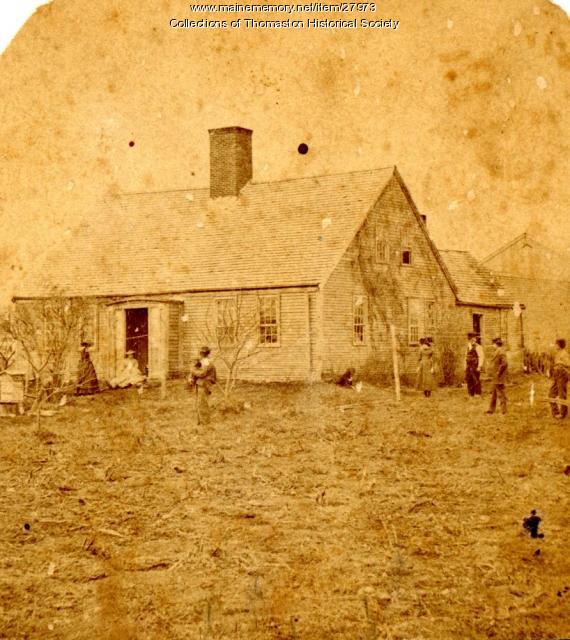Keywords: Always Fresh
Item 16039
Always Fresh potato bag, Caribou, ca. 1975
Contributed by: Southern Aroostook Agricultural Museum Date: circa 1975 Location: Caribou Media: Paper
Item 35158
Herring weir pound, Lubec, ca. 1935
Contributed by: Lubec Historical Society Date: circa 1935 Location: Lubec Media: Photographic print
Exhibit
Among the Lungers: Treating TB
Tuberculosis -- or consumption as it often was called -- claimed so many lives and so threatened the health of communities that private organizations and, by 1915, the state, got involved in TB treatment. The state's first tuberculosis sanatorium was built on Greenwood Mountain in Hebron and introduced a new philosophy of treatment.
Exhibit
Lt. Charles Bridges: Getting Ahead in the Army
Sgt. Charles Bridges of Co. B of the 2nd Maine Infantry was close to the end of his two years' enlistment in early 1863 when he took advantage of an opportunity for advancement by seeking and getting a commission as an officer in the 3rd Regiment U.S. Volunteers.
Site Page
Mount Desert Island: Shaped by Nature - …then came the settlers…
"were always camping around the fresh water ponds…. They made beautiful baskets and did beautiful bead work.” ...next came the artists and rusticators."
Site Page
Strong, a Mussul Unsquit village - Other Recreation
"A "Take-Out Dinner" fresh from the brook, Strong, ca. 1895Strong Historical Society There were many guys here from Strong that shot huge deer."
Story
Cleaning Fish or How Grandfather and Grandmother got by
by Randy Randall
Grandfather and Grandmother subsisted on the fish Grandfather caught, not always legally.
Story
Beef Cutlet always reminds me of home in Iran
by Parivash Rohani
Making beef cutlet in Maine connects me to my home in Iran and my Baha'i faith.
Lesson Plan
Grade Level: 9-12
Content Area: Social Studies, Visual & Performing Arts
When European settlers began coming to the wilderness of North America, they did not have a vision that included changing their lifestyle. The plan was to set up self-contained communities where their version of European life could be lived. In the introduction to The Crucible, Arthur Miller even goes as far as saying that the Puritans believed the American forest to be the last stronghold of Satan on this Earth. When Roger Chillingworth shows up in The Scarlet Letter's second chapter, he is welcomed away from life with "the heathen folk" and into "a land where iniquity is searched out, and punished in the sight of rulers and people." In fact, as history's proven, they believed that the continent could be changed to accommodate their interests. Whether their plans were enacted in the name of God, the King, or commerce and economics, the changes always included and still do to this day - the taming of the geographic, human, and animal environments that were here beforehand.
It seems that this has always been an issue that polarizes people. Some believe that the landscape should be left intact as much as possible while others believe that the world will inevitably move on in the name of progress for the benefit of mankind. In F. Scott Fitzgerald's The Great Gatsby a book which many feel is one of the best portrayals of our American reality - the narrator, Nick Carraway, looks upon this progress with cynicism when he ends his narrative by pondering the transformation of "the fresh green breast of a new world" that the initial settlers found on the shores of the continent into a modern society that unsettlingly reminds him of something out of a "night scene by El Greco."
Philosophically, the notions of progress, civilization, and scientific advancement are not only entirely subjective, but also rest upon the belief that things are not acceptable as they are. Europeans came here hoping for a better life, and it doesn't seem like we've stopped looking. Again, to quote Fitzgerald, it's the elusive green light and the "orgiastic future" that we've always hoped to find. Our problem has always been our stoic belief system. We cannot seem to find peace in the world either as we've found it or as someone else may have envisioned it. As an example, in Miller's The Crucible, his Judge Danforth says that: "You're either for this court or against this court." He will not allow for alternative perspectives. George W. Bush, in 2002, said that: "You're either for us or against us. There is no middle ground in the war on terror." The frontier -- be it a wilderness of physical, religious, or political nature -- has always frightened Americans.
As it's portrayed in the following bits of literature and artwork, the frontier is a doomed place waiting for white, cultured, Europeans to "fix" it. Anything outside of their society is not just different, but unacceptable. The lesson plan included will introduce a few examples of 19th century portrayal of the American forest as a wilderness that people feel needs to be hesitantly looked upon. Fortunately, though, the forest seems to turn no one away. Nature likes all of its creatures, whether or not the favor is returned.
While I am not providing actual activities and daily plans, the following information can serve as a rather detailed explanation of things which can combine in any fashion you'd like as a group of lessons.












